Leeds Summer Seminar 2025: Key take aways
An Appointed Person, in-house specialists, and UK IPO examiners were just a few of the expert voices to join us for our brand-new event in Leeds.
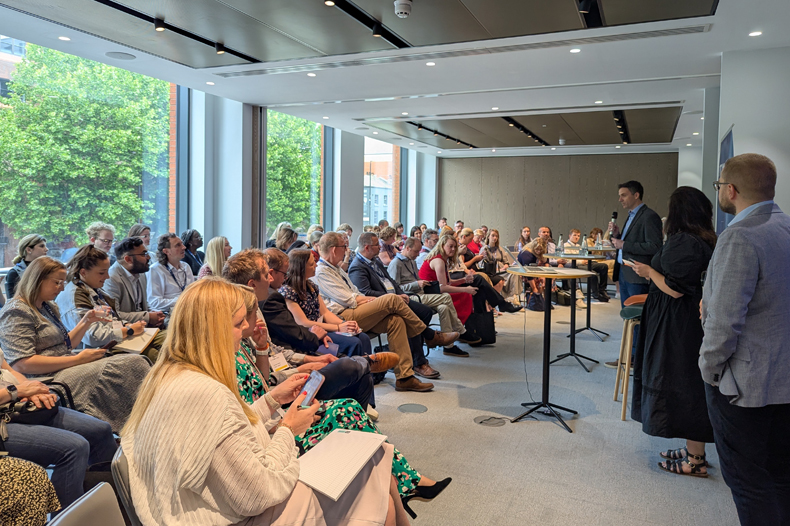
Kindly hosted by Walker Morris, our first ever Summer Seminar was an insightful afternoon, allowing delegates to catch up with peers over a light lunch before diving into our roster of top-tier speakers.
Tricky topics and top tips from an AP
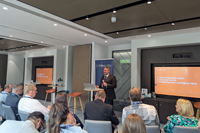
Dr. Brian Whitehead began by telling delegates everything they need to know about the Appointed Person (AP), including a brief history of their role and the type of cases they most commonly encounter.
Section 77 TMA 1994:
“An “appointed person” means a person appointed by the Lord Chancellor to hear and decide appeals under this Act”.
Brian highlighted the low success rate with appeals, attributing much of it to the quality of the Hearing Officers (HO) and the work they do, and the high threshold for an appeal, stating you need to show either a “distinct and material error of principle or that the HO decision was wrong.”
Delegates were also treated to a series of ‘dos and don’ts’ from Brian’s personal experience handling appeals. Number one on his list referenced the Greybox ((O/106/20, Iain Purvis KC) case, where he feels lack of clarity and subjectivity make it impossible to have any sensible debate about whether the Hearing Officer was right.
Brian’s advice: “Don’t pretend that finding a sign to be ‘visually similar to a medium degree’ rather than ‘a high degree’ (or any variant on such a finding) is an error of principle.”
Skykick v Sky: The B-Sides
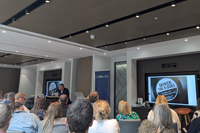
Following the eight-year saga of the Skykick v Sky case, barrister Simon Malynicz KC was keen to uncover some of the outtakes and unfinished arguments, otherwise referred to as “the B-Sides”, that will influence future cases.
Simon began by exploring the definitional problems with the bad faith argument and the need to keep it flexible. With each bad faith case differing from the last, and none of which providing a comprehensive definition of what is bad faith, Simon explains it can be a risky move. However, he advised delegates to “be confident if you smell something fishy in a trade mark registration programme, or even in one single registration.”
This led nicely onto the IP Translator argument, with Simon emphasising the importance of clarity and precision, “You can't have something that's too flabby. You can't have something that's incomprehensible. And you can't have something that you need to look some other document up to find out what it means. It's got to mean what it says.”
Further to this, Simon shone a light on the problem with partial invalidity. The European Union Intellectual Property Network (EUIPN) says that where bad faith is established, the default position is totally invalid. However, in the case of Skykick v Sky, the interpretation of the law seemed to differ and relied upon:
Article 7:
Grounds for refusal or invalidity relating to only some of the goods or services
Where grounds for refusal of registration or for invalidity of a trade mark exist in respect of only some of the goods or services for which that trade mark has been applied or registered.
Simon argued that this varied approach to the law creates a penumbra, which in fact can incentivise dishonesty and reward abuse of trade marks.
Insider insights
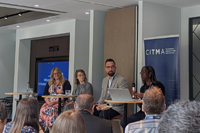
This session was chaired by Ese Akpogheneta, Trade Mark and Marketing Counsel at BAT, and provided delegates with the inside scoop on working in-house, as well as tips on collaborating with attorneys.
The perks
Olivia Hamilton from Nestlé revealed how she gets to help shape company policy and strategy, often getting together with the right people to write the policies and help implement them.
She will also have a voice in leadership team meetings, helping bring UK topics to global IP attention by advising and challenging ideas, where necessary.
Ese also expressed her joy at being at the birth of a product and the involvement she can have in its journey to market.
The challenges
For Rebecca Piper from Asmodee the biggest challenge has been adjusting to the move from private practice to in-house and conquering her imposter syndrome.
Joining a business that had never had an in-house counsel before, there were some barriers to overcome in demonstrating the value she added.
She explained, “Quite a serious, real-world matter happened a few months into me joining. I showed my worth in terms of liaising with you guys [the delegates] and making sure that the management understood. But then I, more importantly, did the follow-up and put in place processes to prevent it happening again.”
Other key challenges included navigating the business and building relationships with the brand and marketing teams.
Ese reflected on some of her experiences, adding, “When you're having to tell someone no, I try not to do it by email. I try to sit down with them and have a conversation and go into more detail as to why we're having to say no and the risks. Once you get them to trust you, you work better with them.”
The opportunities
There are many opportunities that can come from working together with private practice lawyers, which the panel were keen to explore. They discussed how collaboration between in-house and private practice can be improved, with communication coming out as a top answer.
As a recent convert from private practice, Charlie Bond from Specsavers gave his view, “Responsiveness is great. That doesn't mean you have to answer everything in half an hour but tell us what you're doing. Give us timelines and make them realistic.”
Charlie also advocated for learning as much as you can about a business you’re going to be working with and to try to factor that into any advice you provide.
Updates from the UK IPO
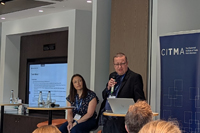
Jeff Lloyd from the UK IPO started the day by providing delegates with the latest design and trade mark policy updates. This included the designs review currently underway, with the consultation expected to take place later in the summer.
Jeff moved on to discuss the positive development of the Design Law Treaty, which was agreed last Autumn, with plans to sign and ratify the treaty in the coming months. Commenting on its potential impact, he said, “The treaty that has emerged, we think, balances harmonisation of designs formalities around the world and it also allows flexibility for countries that want to protect, for example, traditional knowledge and traditional cultural expressions or want to have provisions for that in the design law.”
He concluded by speaking about the One IPO digital transformation project, with particular emphasis on the removal of the series mark service, “I think it's fair to say that opinion was divided in the consultation, and the government response reflects that, but we have done quite a lot of more detailed analysis on the impact on businesses.
He added, “We think the overall outcome will be positive for businesses and balanced with the simplification benefits it delivers for our One IPO programme.”
Charlotte Champion, a head of examinations at the UK IPO, wrapped up the session by diving into the IPO’s views on the SkyKick v Sky decision.
The case has demonstrated that an overly broad specification could be considered as a bad faith filing, making it clear the responsibility is going to be on the applicant to consider the scope of their applications moving forwards.
As a result of this, the IPO will soon be publishing a Practice Amendment Notice (PAN) which will set out clear expectations for applicants when filing their specifications and what they need to think about.
What lies ahead: An interactive discussion
The day was rounded off with an engaging session on some of the biggest questions in the industry right now.
Joined by an expert panel, consisting of Ese Akpogheneta (BAT), Charlotte Champion and Jeff Lloyd (UK IPO) Simon Malynicz KC (Hogarth Chambers), and Dr Brian Whitehead (HLK and Appointed Person), delegates were invited to have their say on topics such as AI, trade mark filing trends, regulatory issues, and diversity and inclusion.
The panel considered the answers, sharing their informed views on each one.

